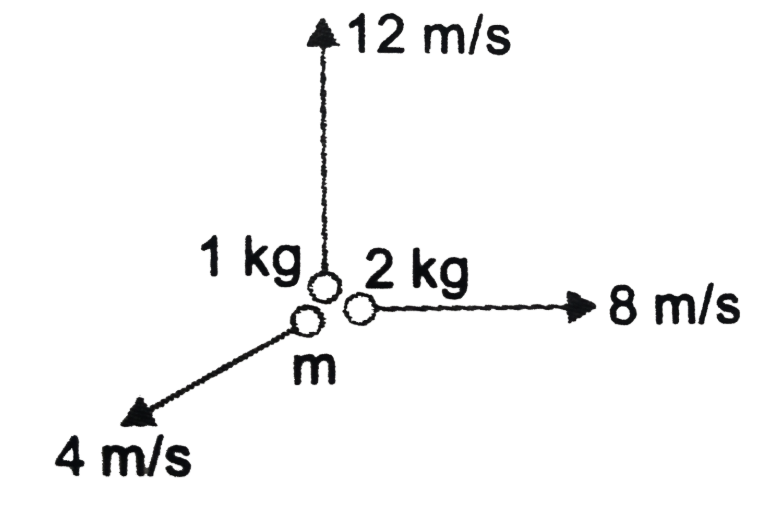Question
Question: An Explosion breaks a rock into three posts in a horizontal plane. Two of them go off at right angle...
An Explosion breaks a rock into three posts in a horizontal plane. Two of them go off at right angles to each other. The first part of mass 1 kg moves with a speed of 12 m/s and the second part of mass 2 kg moves with 8 m/s speed. If the third part flies off with 4 cm/s speed, then it's mass is
A. 3kg
B. 5kg
C. 7kg
D. 17kg
Solution
Hint: In this type of question as we know initial rock is at rest and after explosion it breaks into three parts. So at this place we apply the conservation of linear momentum.
Conservation of linear momentum states that initial momentum of the object remains the same after collision.
Complete step-by-step answer:
The given explosion breaks a rock into three parts.

As given two parts of mass m1=1 kg and mass m2=2 kg moves perpendicular with speed v1=12 m/s and v2=8 m/s respectively.
Linear momentum of first part (p1)=mass×speed
=m1v1
⇒p1=1×12=12 kg m/s
Linear momentum of second part (p2)=mass×speed
=m2×v2
⇒p2=2×8=16 kg m/s
Presultant=p12+p22+2p1p2cosθ
θ= Angle Between the momentum of Both Parts.
Presultant=(12)2+(16)2+2×12×16cos90∘
=144+256=400=20 kg m/s .......... 1.
Linear momentum of third part (p3)=mass×speed
=m3×v3
=4 m3 ...... 2
Initial Momentum of rock =mass×speed
=m×0
=0 kg m/s
By momentum conservation
Initial momentum = Final momentum
⇒0=p1+p2+p3
⇒p3=−(p1+p2) ......... 3
Negative sign shows the third part of rock move in the opposite direction as a result of part First and second.
Substitute the value of p3 and presultant from equation 1 and 2 equation 3
⇒4m3=20
⇒m3=420=5 kg
Therefore, the correct choice is (B) 5 kg
Note: As we know the initial rock is at rest so the initial momentum will be zero. This initial momentum is equal to the final momentum of each part. It is possible due to conservation of momentum.
